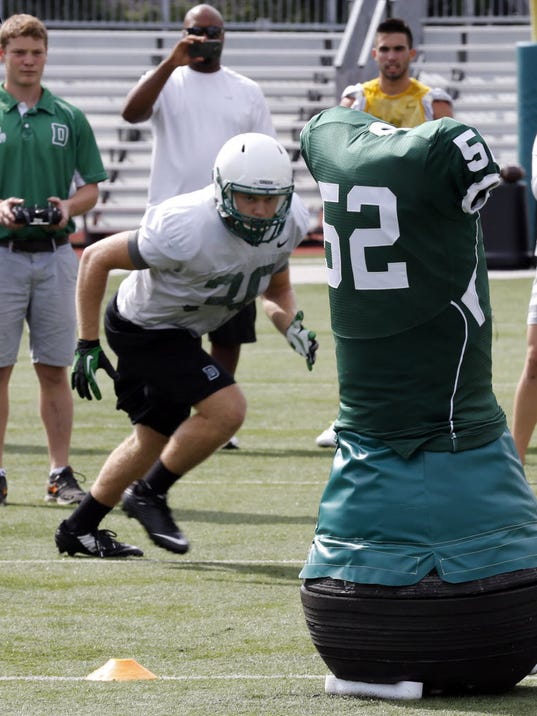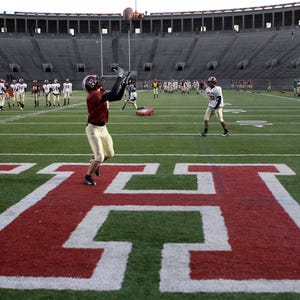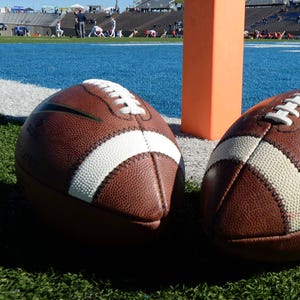Nancy Armour, USA TODAY Sports
March 1, 2016

Dartmouth College Engineering graduate Quinn Connell, upper left, controls the movement of the team's ìMobile Virtual Playerî during college football practice last August in Hanover, N.H. In an effort to avoid concussions, the team practices with its new ìMobile Virtual Player,î which the school says is the only powered device that simulates a real football player in size, weight, agility and speed.(Photo: Jim Cole/AP)
Leave it to the Ivy Leaguers to figure out a simple way to protect their football players’ brains.
Maybe even save the game in the process.
The agreement by Ivy League coaches to eliminate tackling in practice is a seismic shift in the effort to prevent chronic traumatic encephalopathy and other devastating effects of head trauma that have been linked to football. As scary as those high-speed collisions and vicious hits during games are, it’s the thousands of hits that players absorb in practice throughout their careers that do the most damage.
Eliminate those hits, and you eliminate the repetitive head trauma that goes with them.
“This changes the trajectory of football,” said Chris Nowinski , who sounded almost giddy after The New York Times reported the decision by the Ivy League coaches Tuesday.
“If we can get every other coach to believe in that and try it themselves, it may reduce future brain trauma among all football players by half with this one change.”
As an alarming number of former players are found with CTE and evidence shows that football is the cause, those who love the game have found themselves torn. Of course we want to protect players, particularly the children who play the game.
But can we do that without destroying football itself? Or, as the hard-liners so darkly predict, turning it into flag football?
The answer, Dartmouth found, is yes.
In 2010, Dartmouth coach Buddy Teevens eliminated full-contact practices during the season as a way to cut down on injuries, including concussions. In the 12 years prior to Teevens’ decision, Dartmouth may as well have had a mortgage on the Ivy League’s basement, that’s how bad the Big Green was.
In the six years since, Dartmouth has gone .500 or better each season and last year was co-champion of the Ivy League.
“It hasn’t hurt our level of play,” Teevens told The Times. “It’s actually made us a better team.”
Don’t take Teevens’ word for it, look at the stats. Dartmouth led the Ivy League in almost every defensive category last year. Only Princeton had more tackles, and the Big Green finished third in the eight-team league in sacks.
By hitting pads and tackling dummies instead of each other, not only were the Dartmouth players spared the traumatic injuries inevitable when large humans collide at full speed, they were forced to refine their tackling technique. Using a helmet as a spear or battering ram may work against another player, but it won’t do much to a padded dummy.
“Everybody knows you can practice smarter without tackling people to the ground and still teach the game. And still teach the game well,” Nowinski said. “We’re just challenging coaches to practice smarter.”
The rest of the Ivy League is convinced, with all eight coaches agreeing last week to eliminate tackling during the season across the conference, according to The Times. It still has to be approved by the Ivy League athletic directors and presidents, and Teevens and Dartmouth athletic director Harry Sheehy declined further comment Tuesday pending that decision.
But if it goes through – and there’s no reason to think it won’t given the Ivy League’s past assertiveness on trying to prevent head trauma – it throws down the gauntlet to every school and conference in the country, regardless of how big or small they are.
If the Ivies can destroy the myth that you can’t win on Saturday – or Sunday – unless your kids are bashing heads Monday through Friday, there’s no reason Nick Saban, Urban Meyer and Dabo Swinney can’t, too.
“Every conference is now on the clock for when they’re going to make this change,” Nowinski said. “And the longer they wait, the worse they’re going to look.”
By no means is the tackling ban a cure for CTE or the other horrifying diseases that have ravaged the brains of former players. But until cures are found, this is as good a remedy as there is.
Follow Nancy Armour on Twitter @nrarmour.


No comments:
Post a Comment